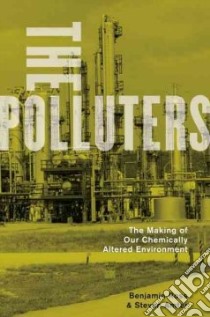The Polluters - 9780199739950
Un libro in lingua di Benjamin Ross Steven Amter edito da Oxford University Press, 2010
- € 25.90
- Il prezzo è variabile in funzione del cambio della valuta d’origine
Benjamin Ross and Steven Amter here tell the story of how the chemical industry, abetted by a compliant government, set loose a plague of pollution that began in the years before and directly following World War II, a plague that still lingers today. The advent of new synthetic chemical products such as Nylon and DDT created new hazards just as the expansion and mechanization of industry exacerbated old ones. Environmental dangers well known today--smog, pesticides, lead, chlorinated solvents, asbestos, and even global warming--were already recognized in that era by chemists, engineers, doctors, and business managers. A few of them spoke out about these dangers, others overlooked scientific truth in pursuit of wealth and prestige, and many struggled to find a balance between the interests of industry and the needs of the wider world.
By the mid-twentieth century, the chemical industry understood that it needed to curb its pollution. But federal government regulation, the only mechanism by which effective control could have been accomplished, faced implacable hostility from the industry. Driven by the twin forces of pecuniary interest and ideological hostility to governmental control, it exercised its considerable political and economic power to block oversight. Discovery of new environmental problems was discouraged, and research that might find them was starved of funds. When dangers did emerge, well-paid advocates concocted grounds for doubt. If a crisis exploded into public view, money and influence were deployed to steer investigations toward reassuring conclusions.
The Polluters provides a panoramic view of intertwined political and scientific struggles in which the apparatus of science was harnessed to the pursuit of political victory rather than objective truth. The chemical industry lobbied congress, suppressed unwelcome research, co-opted experts, and, on occasion, simply used endless study as an excuse for inaction. Eventually the political and bureaucratic institutions created by the industry to fight off governmental oversight took on a life of their own and obstructed adequate environmental controls.
Informazioni bibliografiche
- Titolo del Libro in lingua: The Polluters
- Sottotitolo: The Making of Our Chemically Altered Environment
- Lingua: English
- Autori : Benjamin Ross Steven Amter
- Editore: Oxford University Press
- Collana: Oxford Univ Pr (Hardcover)
- Data di Pubblicazione: 01 Settembre '10
- Genere: SCIENCE
- Argomenti : Chemical industry Environmental aspects United States Chemicals Environmental aspects United States Pollutants
- Pagine: 223
- ISBN-10: 0199739951
- EAN-13: 9780199739950


